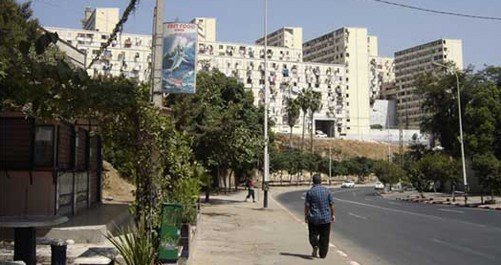young mediterraneans
Life of Odds and Ends


Lakhdari Hicham, Mebarki Fatah and Zouari Walid are friends. They are 20 years old and live at Diar Saada and Diar Chems, on Algiers' heights, near the presidency of the Algerian Republic and the posh districts. On their way back home, they pass by the high walls of luxurious villas. In reality, they have no home. Since the age of four, Hicham spends his nights outside to keep an eye on other people's cars. Parking attendant, "a job" that the youngsters have invented to survive. The three boys know how to drive but they have no "too expensive" to get driving licence. Not being able to propose a real job, the State turns a blind eye on these illegal parking areas. When asked, "how do you manage to live?", they answer spontaneously "by the will of God". In any case, Hicham has no choice. His father is unemployed; they are twelve brothers and sisters plus the grandmother to share a two-roomed apartment in the town of Diar SAADA. Since the boys are not ashamed to show us where they live, we meet them at Brahim's place, sort of the "big brother" of the area. He works as a security guard in a school and he struggles to put unsteady students back on their feet. He gives a helping hand to those who are attracted by drug dealing and other trafficking. He buys pens and copybooks with his own money for those who have the will to study. Brahim struggles in his own small ways against a system that crushes the youngsters of the city. IOL asks to organise the meeting in Arabic as "they don't speak good French". With a speech defect that makes him lisp, Hisham tells about the promiscuity of a dwelling where it is impossible to find a corner to sleep, the smartness to survive, the responsibility of a whole family and the unwavering wall of despair. Hisham's hair is already whitening under his cap and he looks like a Parisian kid.
Fatah has also left school quite young and started "to cobble together" that is to do all kinds of odd jobs. He lives with his seven brothers and sisters in a one-roomed apartment. "I asked the neighbours to lend me their cellar to settle there and they refused". His elder brother who is a car park attendant is in prison. "He has invited a friend of the district to sleep in the van where he has been spending his nights for years. El Dawla (the State in the Algerian dialect) was patrolling the area because two robberies had taken place during that day. They checked my brother and his friend and they found that the latter had a big quantity of hash. They picked them up and condemned them to 18 months in prison but my brother is innocent".
Fatah shows a sort of resignation when confronted to his problems, to the hassles of the "Dawla" but he gets angry when he remembers that when he left primary school, his father had told him, "go and get by, go to steal, I don't care but don't count on me". He understands his father but he still doesn't admit things. "I could have succeeded like all others but I prefer to navigate (to get by)."
Walid navigates as well. He's the only secondary school student of the trio and he should pass the exams to get his secondary school certificate this year. He doesn't believe he can make it. "I have other things to think of" and so do his friends. Hicham laughs. "Oh he doesn't believe he can make it poor boy, it's better if he doesn't tell you his average note this trimester". Walid has excuses as his mother died during childbirth at the beginning of 2009. His father remarried and Walid lives with his two aunties and grandmother in a gloomy two-roomed apartment on the ground floor. His three sisters stayed with his maternal family. Well dressed, he's the good-looking boy of the group and the one who speaks a little about a future with studies and work with little conviction. The teachers are tired of their own difficulties so they recommend private lessons "at 2000 dinars a month!" There is no place where to prepare and revise exams. "In the area, we only have one private library and the entrance is not free. We have to pay for everything here, sports, studies; in Algeria, if you don't have money you're not worth anything". All three of them go occasionally to web cafés to "watch films". Internet, chats, social networks are not their cup of tea especially Fatah who did not go further than primary school.
At Walid's secondary school, apart from a few computing beginner lessons, the students have no access to computers. They rarely read the press and the content doesn't interest them, not even the current issue dealing with corruption. "In what is it our business? It's happening between them, the big heads up there. I would love to spend two or three months in prison and then come out to make the best out the billions I would have stolen". Fatah and Hicham agree: "they share the money of petrol between them. The most important thing is that people don't stir and they even get organised to leave them in their misery; imagine a kilo of lentils for 200 DA! (Approximately 2 Euros. The Algerian guaranteed minimum wage is of approximately 120 Euros i.e. 12000 dinars). "They only reckon violence", points out Walid, "It was only when the people of Diar Chems started a riot, and the youngsters broke everything that the State started to rehouse them. They were afraid of violence, I tell you it's nothing else!" In October, the 1500 families who live in infernal conditions in buildings constructed by the French colonial authorities in 1958 started violent riots in order to be rehoused when they got to know that outsiders had benefited from social housing. Moreover, the town hall had decided to destroy the slums that the large families had constructed on their deteriorated buildings. The police had repressed the riots.
The solution? None apart from leaving. They repeat that there's no future here. This is so evident for them. A lot of our friends have managed to "burn" (immigrate illegally) and some of them have come back rich". Leaving is the myth fostered obstinately by several Algerians. Our three friends have tried to "burn" through the harbour of Algiers several times in vain. They have tried other cities like Bejaia on the Kabyle coast and came back to the district. Their passports have expired a long time ago and they will not be renewed. "We will never have a visa. The foreigners who come to work in our country are all happy here. And I'm not talking about the poor Africans but about Italians, French and Chinese. Their country knows how to protect them and here our dawla (State) is haggara' (unjust). 45000 foreigners of only 105 different nationalities work legally in Algeria in the framework of investments or infrastructure contracts.
Nevertheless, 20 years is the age of first loves! Hicham and Walid have girlfriends. The first one met her in the street. "I flirted with her in the city". The second one met her at his secondary school. Walid's girlfriend is the bakers' daughter. "They are the ones who pay for our drinks when we go out" laughs Walid and he adds, "it's important to have someone to open your heart to". And then there's football, the qualification to the World cup 2010 but that's another story.





